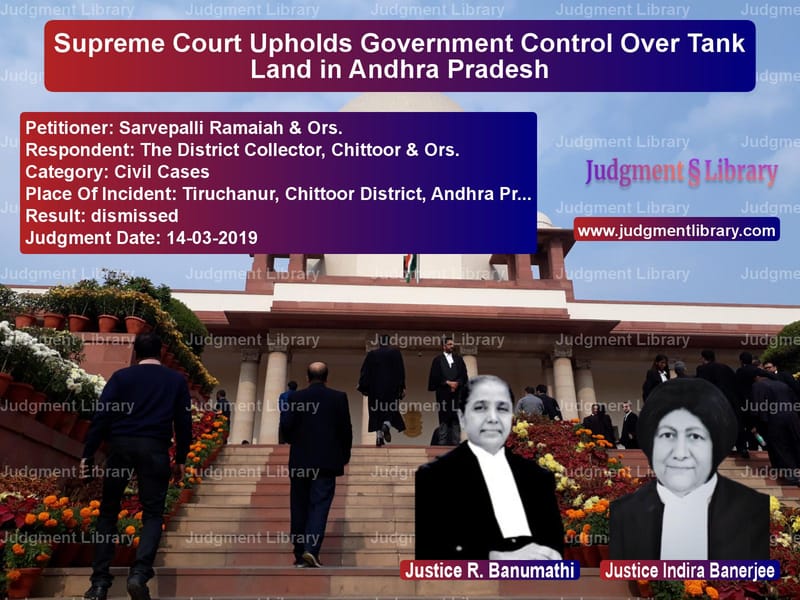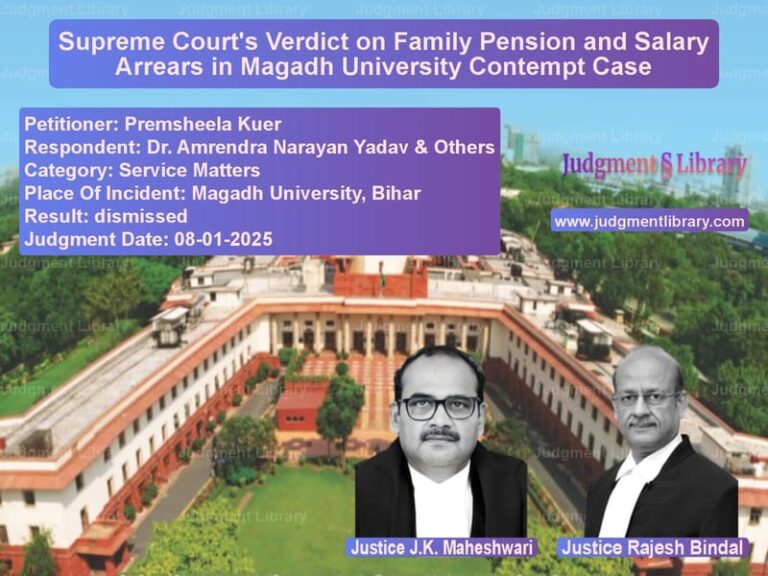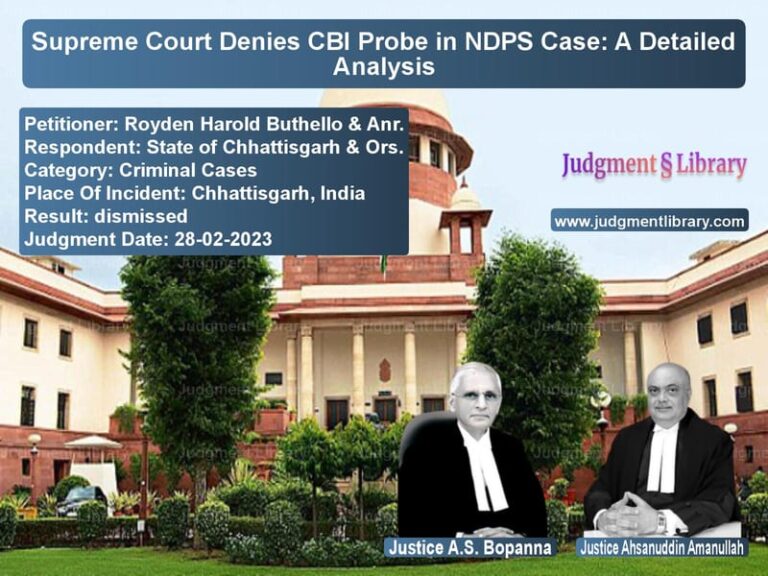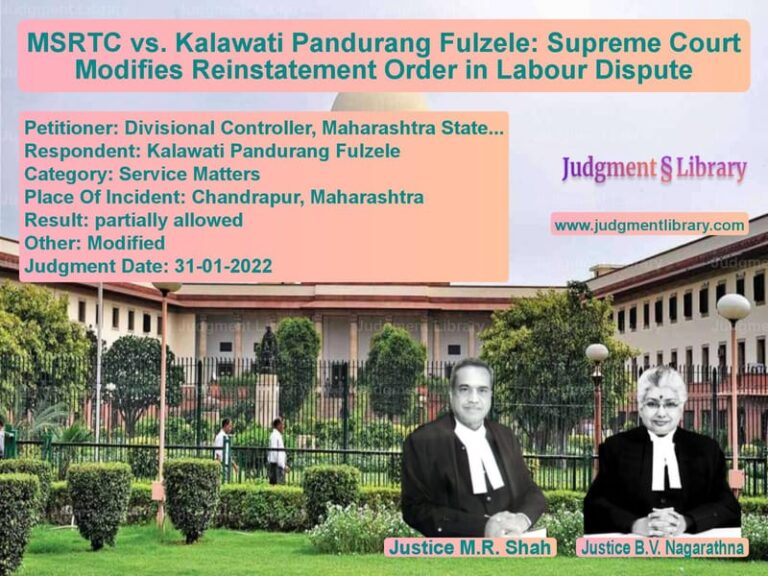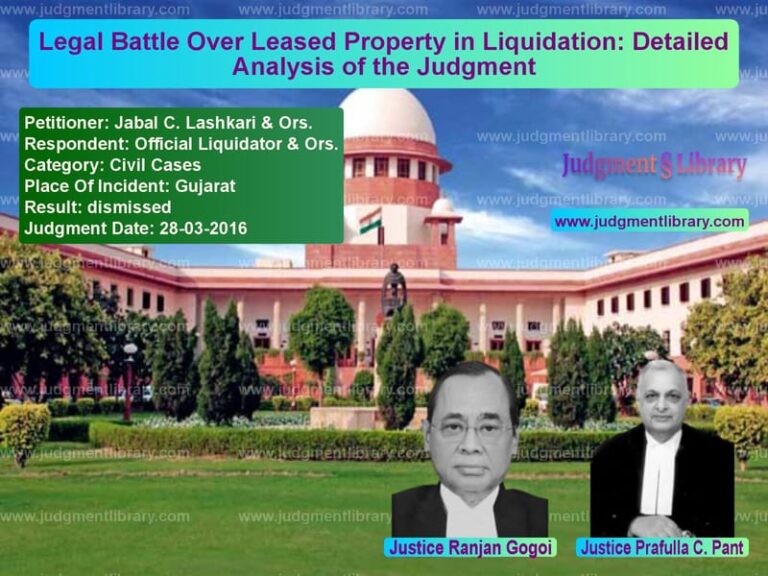Supreme Court Upholds Government Control Over Tank Land in Andhra Pradesh
The case of Sarvepalli Ramaiah (D) & Ors. vs. The District Collector, Chittoor District & Ors. revolves around the rejection of a ryotwari patta application for land classified as a tank under the Andhra Pradesh Inams (Abolition & Conversion into Ryotwari) Act, 1956. The Supreme Court upheld the High Court’s ruling that the land was a government water body and not eligible for private ownership.
The appellants, legal heirs of Sarvepalli Ramaiah, sought ownership over 11 acres of land in Survey No. 234, Tiruchanur Village, Chittoor District. They contended that the land had been granted to their predecessor by Hathiramjee Math in 1940 and that they had continuously possessed and cultivated it.
In 1980, the Inams Deputy Tahsildar issued ryotwari pattas for the land. However, in 1984, the Chittoor District Gazette classified the land as “Peddacheruvu Tank Poramboke” under Section 2-A of the Inams Abolition Act. This meant that the land was a government-owned water body and not subject to private ownership or patta issuance.
Legal Issues Before the Supreme Court
The central issues in the case were:
- Whether land classified as a water body under Section 2-A of the Andhra Pradesh Inams Abolition Act could be granted as a ryotwari patta.
- Whether the government’s classification of the land in 1984 was legally valid.
- Whether the appellants had a valid claim based on their alleged possession and the ryotwari pattas issued in 1980.
Arguments by the Petitioner (Sarvepalli Ramaiah & Ors.)
- Their predecessor-in-interest had obtained a valid patta from Hathiramjee Math in 1940.
- They had received ryotwari pattas in 1980, which had never been challenged or canceled by the government.
- Their names were recorded in revenue records, and they had paid land revenue for decades.
- The classification of the land as “tank poramboke” in the 1984 Gazette was erroneous and should be overturned.
- They had enjoyed uninterrupted possession of the land for several decades.
Arguments by the Respondents (The District Collector, Chittoor & Ors.)
- The entire Survey No. 234, measuring 113.67 acres, was classified as “Peddacheruvu Tank” under Section 2-A of the Andhra Pradesh Inams Abolition Act in 1984.
- Land classified as “tank poramboke” is not eligible for private ownership or ryotwari patta under the law.
- The ryotwari pattas allegedly issued in 1980 were fraudulent and issued by a Deputy Tahsildar who had been found guilty of issuing illegal pattas.
- The petitioners never challenged the 1984 Gazette Notification, making their claim legally unsustainable.
- Section 2-A explicitly states that all water bodies and communal lands vest in the government free of encumbrances.
Supreme Court’s Analysis and Judgment
The Supreme Court reviewed the provisions of the Andhra Pradesh Inams Abolition Act and found that Section 2-A explicitly vests all communal lands, including tanks and water bodies, in the government. The Court made the following key observations:
- “By virtue of Section 2-A of the 1956 Act, all forest lands, grazing lands, communal lands, river streams, porambokes, tanks, tank beds, etc., vested in the government free from encumbrances.”
- “No person can claim tenancy, occupancy, or ownership in respect of any land classified under Section 2-A.”
- “The claimants did not challenge the Gazette Notification of 1984, which conclusively classified the land as a tank. Without doing so, they cannot seek a declaration of ownership.”
- “The Inams Deputy Tahsildar who issued the alleged pattas had been found guilty of issuing fraudulent pattas in other cases, raising serious doubts about the authenticity of the 1980 pattas.”
- “Land classified as ‘tank poramboke’ serves an important ecological function. Encroachment and conversion of such land to private ownership cannot be permitted.”
Final Judgment
The Supreme Court ruled that:
- The land in Survey No. 234, Tiruchanur, was a government water body and vested in the state under Section 2-A.
- The ryotwari pattas issued in 1980 were invalid as the land was ineligible for private ownership.
- The appellants had no legal claim to the land.
- The appeal was dismissed, affirming the High Court’s ruling that the land could not be alienated.
Significance of the Judgment
This ruling reinforces that:
- Water bodies and communal lands vested in the government under Section 2-A cannot be privately owned.
- Gazette notifications carry legal finality unless challenged in time.
- Ryotwari pattas issued for tank poramboke lands are invalid under the law.
- Encroachment on government water bodies poses a threat to environmental conservation and must be prevented.
Conclusion
The Supreme Court’s decision in Sarvepalli Ramaiah vs. The District Collector, Chittoor serves as a landmark ruling on land classification and government control over water bodies. The judgment ensures that tank lands remain under public ownership and are not illegally encroached upon through fraudulent pattas.
Petitioner Name: Sarvepalli Ramaiah & Ors..Respondent Name: The District Collector, Chittoor & Ors..Judgment By: Justice R. Banumathi, Justice Indira Banerjee.Place Of Incident: Tiruchanur, Chittoor District, Andhra Pradesh.Judgment Date: 14-03-2019.
Don’t miss out on the full details! Download the complete judgment in PDF format below and gain valuable insights instantly!
Download Judgment: Sarvepalli Ramaiah & vs The District Collect Supreme Court of India Judgment Dated 14-03-2019.pdf
Direct Downlaod Judgment: Direct downlaod this Judgment
See all petitions in Property Disputes
See all petitions in Landlord-Tenant Disputes
See all petitions in Damages and Compensation
See all petitions in Judgment by R. Banumathi
See all petitions in Judgment by Indira Banerjee
See all petitions in dismissed
See all petitions in supreme court of India judgments March 2019
See all petitions in 2019 judgments
See all posts in Civil Cases Category
See all allowed petitions in Civil Cases Category
See all Dismissed petitions in Civil Cases Category
See all partially allowed petitions in Civil Cases Category

